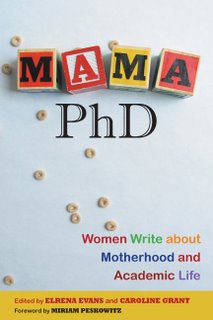In Theory/In Practice: On Choosing Children and the Academy
September 9th, 2009Mama, PhD owes its existence in many ways to Literary Mama, the website through which coeditors Caroline and Elrena first met, and Lisa Harper’s contribution, In Theory/In Practice: On Choosing Children and the Academy, also originated in a Literary Mama conversation. Lisa had published an essay in Literary Reflections, the section of Literary Mama that Caroline was editing at the time, and our correspondence about that piece, Flying Home, led us to solicit a contribution for Mama, PhD.
Lisa’s essay appears in the fourth section of the book, Momifesto, in which writers consider changes the academy needs to make to become more family-friendly. Lisa describes her experience facing the academic job market after two years in a visiting professorship and realizing that, in order to have the life she wants–with a family and time for creative nonfiction writing–she needs to leave the “community I had always assumed would be my professional home.” She winds up in an adjunct teaching position, the kind of position that is typically considered the worst kind of temporary work for an academic. As Lisa writes:
“Conventional wisdom has it—and my earlier experience had certainly confirmed—that adjunct faculty serve as second-class citizens on most university campuses. Lower pay, the absence of benefits, the lack of job security, poor course assignments, and overwork are only the most pragmatic problems. Compounding these difficulties, in many institutions, part-timers are largely excluded from the life of the department, from administrative responsibilities (and, therefore, from administrative power), from the intellectual and collegial respect afforded their full-time colleagues, and from the possibilities for career advancement in their own and other institutions.
“But in my new program, I worked with a group of writers, almost all of whom served as adjunct faculty, who seemed genuinely to like one another, and who were happy to be teaching together. Although the practical, financial challenges of adjunct work remained, we also were largely freed from the administrative burdens that took time from the primary pleasures of writing and teaching. As part-timers, we were all equals. As part-timers, it was a given that we had families, occupations—in short, full lives—outside the academy. This fact was respected by all, including the students who had their own demanding lives outside of our program. Contrary to prevailing academic wisdom, here was a program that thrived because of—not in spite of—part-time labor. My colleagues and I talked about pedagogy, supported each others’ book releases, and traded manuscripts. We attended programwide readings and read each semester from our own works in progress. There was a clear, communal sense of purpose and a devotion to the art of teaching that equaled our primary calling to write. It was a rare find and a great freedom to be part of such a community.”
Today, Lisa “is still Adjunct Professor of Writing in the MFA Program at the University of San Francisco. She continues to juggle writing, teaching, and parenting with varied degrees of success. On some days, she eagerly anticipates September 2010 when her youngest will enter full day kindergarten. On other days, this fact makes her weep.”
You can find out more about Lisa’s projects–one of which is an anthology, coedited with Caroline, about what we eat and why it matters–over at her website.


 Join us on Facebook
Join us on Facebook